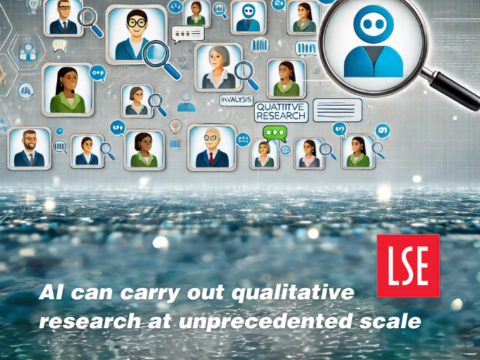Want to know what the ten most read LSE Impact Blog posts were this year? We count down the ten most read blogposts published in 2022.
10. Requiem for a Tweet – Is there a future for the academic social capital held on the platform?
 As the real possibility of platform death looms for Twitter, Mark Carrigan reflects on the role of the platform as stage for the accumulation of academic social capital and urges academics, learned societies, funders and those involved in the field of scholarly communications to think carefully about their role in the future of online academic sociability.
As the real possibility of platform death looms for Twitter, Mark Carrigan reflects on the role of the platform as stage for the accumulation of academic social capital and urges academics, learned societies, funders and those involved in the field of scholarly communications to think carefully about their role in the future of online academic sociability.
9. 5 Strategies for Hitting a Writing Deadline
 To adapt the well-known saying: there are few constants in academia other than death and deadlines. Drawing on their experience as a writing coach and author, Delia Lloyd presents five strategies for getting writing done when you really need to.
To adapt the well-known saying: there are few constants in academia other than death and deadlines. Drawing on their experience as a writing coach and author, Delia Lloyd presents five strategies for getting writing done when you really need to.
8. By focusing on outputs, rather than people, we misunderstand the real impact of research
 Arguing that science policy remains shaped by enduring ideas of linear knowledge transfer from research to society, Paul Nightingale and Rebecca Vine, propose that research impact in contemporary service economies lies predominantly within the application of human expertise to complex problems. By focusing on researchers, rather than research, they suggest research systems would be better positioned to appreciate the multifaceted ways in which fields of research, such as the social sciences, impact society.
Arguing that science policy remains shaped by enduring ideas of linear knowledge transfer from research to society, Paul Nightingale and Rebecca Vine, propose that research impact in contemporary service economies lies predominantly within the application of human expertise to complex problems. By focusing on researchers, rather than research, they suggest research systems would be better positioned to appreciate the multifaceted ways in which fields of research, such as the social sciences, impact society.
 In How the World Really Works: A Scientist’s Guide to Our Past, Present and Future, Vaclav Smil explores seven fundamental areas that govern human survival and prosperity, covering topics such as food production, energy and globalisation. While Smil’s educational efforts to expose some of the sinews of our modern economy are salutary, Iancu Daramus questions the book’s vision of the future of energy and the sustainability revolution.
In How the World Really Works: A Scientist’s Guide to Our Past, Present and Future, Vaclav Smil explores seven fundamental areas that govern human survival and prosperity, covering topics such as food production, energy and globalisation. While Smil’s educational efforts to expose some of the sinews of our modern economy are salutary, Iancu Daramus questions the book’s vision of the future of energy and the sustainability revolution.
6. Descriptive statistics are essential to making complex analyses useful
 In response to the ever-growing volume of data, quantitative social research has become increasingly dependent on complex inferential methods. In this post, Kevin R. Murphy argues that whilst these methods can provide insights, they should not detract from the significance of the comparatively simple descriptive statistics often found in table 1, which play an important role in communicating the significance of the research to policymakers and other research users.
In response to the ever-growing volume of data, quantitative social research has become increasingly dependent on complex inferential methods. In this post, Kevin R. Murphy argues that whilst these methods can provide insights, they should not detract from the significance of the comparatively simple descriptive statistics often found in table 1, which play an important role in communicating the significance of the research to policymakers and other research users.
5. Article Processing Charges (APCs) and the new enclosure of research
 Drawing on a recent analysis of APC pricing and movements within the commercial publishing sector, Gunnar Sivertsen and Lin Zhang argue that APCs have now firmly established themselves as the predominant business model for academic publishing. Highlighting the inequalities inherent to this model, they posit now is the time to consider alternatives.
Drawing on a recent analysis of APC pricing and movements within the commercial publishing sector, Gunnar Sivertsen and Lin Zhang argue that APCs have now firmly established themselves as the predominant business model for academic publishing. Highlighting the inequalities inherent to this model, they posit now is the time to consider alternatives.
4. Is doing a PhD bad for your mental health?
 Poor mental health amongst PhD researchers is increasingly being recognised as an issue within higher education institutions. However, there continues to be unanswered questions relating to the propensity and causality of poor mental health amongst PhD researchers. Reporting on a new comparative survey of PhD researchers and their peers from different professions, Dr Cassie M Hazell and Dr Clio Berry find that PhD researchers are particularly vulnerable to poor mental health compared to their peers. Arguing against an inherent and individualised link between PhD research and mental health, they suggest institutions have a significant role to play in reviewing cultures and working environments that contribute to the risk of poor mental health.
Poor mental health amongst PhD researchers is increasingly being recognised as an issue within higher education institutions. However, there continues to be unanswered questions relating to the propensity and causality of poor mental health amongst PhD researchers. Reporting on a new comparative survey of PhD researchers and their peers from different professions, Dr Cassie M Hazell and Dr Clio Berry find that PhD researchers are particularly vulnerable to poor mental health compared to their peers. Arguing against an inherent and individualised link between PhD research and mental health, they suggest institutions have a significant role to play in reviewing cultures and working environments that contribute to the risk of poor mental health.
 Misinformation has been a prominent paradigm in the explanation of social, political, and more recently epidemiological phenomena since the middle of the last decade. However, Daniel Williams argues that a focus on misinformation is limiting when used to explain these phenomena. Primarily, as it distracts us from more important ways in which information can be misleading, and it overlooks the social dynamics of competition involved in information marketplaces that produce effective rationalisations of the favoured narratives of different social groups.
Misinformation has been a prominent paradigm in the explanation of social, political, and more recently epidemiological phenomena since the middle of the last decade. However, Daniel Williams argues that a focus on misinformation is limiting when used to explain these phenomena. Primarily, as it distracts us from more important ways in which information can be misleading, and it overlooks the social dynamics of competition involved in information marketplaces that produce effective rationalisations of the favoured narratives of different social groups.
2. When publishing becomes the sole focus of PhD programmes academia suffers
 Reporting on their findings from qualitative research project focused PhD students across China, Hugo Horta and Huan Li explore how a culture of publication has become central to doctoral study and discuss how this can negatively impact wider aspects of academic life.
Reporting on their findings from qualitative research project focused PhD students across China, Hugo Horta and Huan Li explore how a culture of publication has become central to doctoral study and discuss how this can negatively impact wider aspects of academic life.
1. New AI tools that can write student essays require educators to rethink teaching and assessment
 AI tools are available today that can write compelling university level essays. Taking an example of sample essay produced by the GPT-3 transformer, Mike Sharples discusses the implications of this technology for higher education and argues that they should be used to enhance pedagogy, rather than accelerating an ongoing arms race between increasingly sophisticated fraudsters and fraud detectors.
AI tools are available today that can write compelling university level essays. Taking an example of sample essay produced by the GPT-3 transformer, Mike Sharples discusses the implications of this technology for higher education and argues that they should be used to enhance pedagogy, rather than accelerating an ongoing arms race between increasingly sophisticated fraudsters and fraud detectors.
If you enjoyed this blog, take a look at our other content on publishing.
Conflict of Interest Statement: I worked for Cabells as Marketing Director from Aug 2018-Jul 2022. This blog originally appeared on LSE Impact Blog: https://blogs.lse.ac.uk/impactofsocialsciences/2023/01/02/2022-in-review-the-top-blogposts-of-2022/
Note: This article gives the views of the authors, and not the position of the NIHR, Dementia Researcher or the LSE Impact Blog. Shared under the Creative Commons Attribution 3.0 Unported (CC BY 3.0)

 Print This Post
Print This Post





